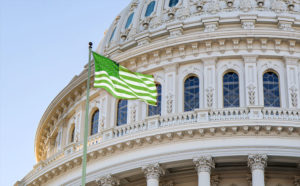May 12, 2020
 House Leadership unveiled legislation today, the Health and Economic Recovery Omnibus Emergency Solutions Act (aka the ‘‘HEROES Act”), to provide additional economic resources and support in response to the global COVID-19 pandemic.
House Leadership unveiled legislation today, the Health and Economic Recovery Omnibus Emergency Solutions Act (aka the ‘‘HEROES Act”), to provide additional economic resources and support in response to the global COVID-19 pandemic.
Included in the language of the bill is HR 1595: The SAFE Banking Act, which amends federal law so that explicitly banks and other financial institutions may work directly with state-legal marijuana businesses. Members of the House of Representatives voted 321 to 103 in favor of the Act in September. Reform advocates, including NORML, had lobbied leadership to include banking reform in the latest COVID relief measure.
NORML also encouraged leadership to include separate provisions in the Act to permit state-licensed cannabis businesses to be eligible to receive loans and other types of financial assistance via the Small Business Administration (SBA). The state-licensed cannabis industry employs more than 240,000 American workers, over four times the number of American workers as does the coal industry. The majority of these businesses are small-to-medium in size.
Over 40 members of Congress signed multiple letters to Congressional Leadership demanding SBA reform.Representative Earl Blumenauer has introduced legislation to address this matter, and in recent days a coalition of reform advocates? along with criminal justice and civil rights groups urged this reform.
Nonetheless, language to amend SBA eligibility was not included in the bill.
NORML Political Director Justin Strekal said: “The inclusion of the SAFE Banking Act in the CARES 2 package is a positive development, but one that’s akin to applying a band-aid to a gaping wound. In the majority of states, these cannabis businesses have been deemed essential during this pandemic. But at the federal level, they are being cast aside by Congress. Those small cannabis businesses facing tough economic times are essentially being told by Congress to shutter their doors and fire their employees.”
He added: “While larger, better capitalized players may be able to weather this storm, smaller cannabis businesses may not be able to do so absent some economic stimulus. By continuing to deny these small businesses eligibility to SBA assistance, it is possible that we could see an acceleration of the corporatization of the cannabis industry in a manner that is inconsistent with the values and desires of many within the cannabis space.”
In the majority of jurisdictions that regulate cannabis marketplaces, lawmakers in recent weeks have designated these operations to be ‘essential’ to the health and well-being of the community. In others, regulators have either relaxed protocols or moved forward with new, emergency rules to facilitate expanded access – such as permitting patients to seek telemedicine appointments and allowing dispensaries to permit curbside pick-up and home delivery.
A separate reform provision included in the package is Section 90009, which requires that the SBA not discriminate against applicants for the “solely because of the applicant’s involvement in the criminal justice system.” NORML’s Strekal praised the proposed change, stating, “This development will help individuals who have suffered under the lasting legacy of marijuana criminalization, and will ensure that they no longer face undue economic discrimination when it comes to being eligible for SBA assistance.”
Under the SBA’s current rules, individuals are automatically disqualified from receiving aid if they’ve been convicted, pleaded guilty, pleaded nolo contendere, placed on pretrial diversion or placed on parole or probation in the last five years.










